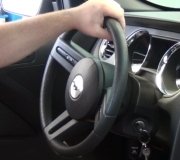Was the brake rotors resurfaced?
Complaints about brake squeak/squeal became a problem when front-wheel drive and semi-metallic brakes arrived on the scene in the 1980s. Semi-metallic pads are harder than their asbestos counterparts, and thus are more apt to chatter and squeal if there are any irregularities or roughness on the rotor surface, or if you notice looseness between the pads and calipers.
Some types of caliper designs are more apt to be noisy than others. The pads in these calipers may not be held as tightly and/or the caliper itself may move around a lot when the brakes are applied. And, as we said earlier, the greater the play in the system, the greater the tendency to make noise. That's why some new car dealers try to dismiss the problem by telling their customers some noise is "normal", leaving the customer no alternative but to live with the problem or to get it fixed by somebody else.
Trying to fix a squeal problem the wrong way can often make the problem worse. If somebody does a quick brake job and replaces the brake pads but doe snot resurface the rotors, the result can be an even louder squeal. The same can happen if the rotors are resurfaced incorrectly, too quickly or with dull tools. Excessive rotor runout can also cause problems
SPONSORED LINKS
Thursday, April 30th, 2009 AT 2:49 AM



